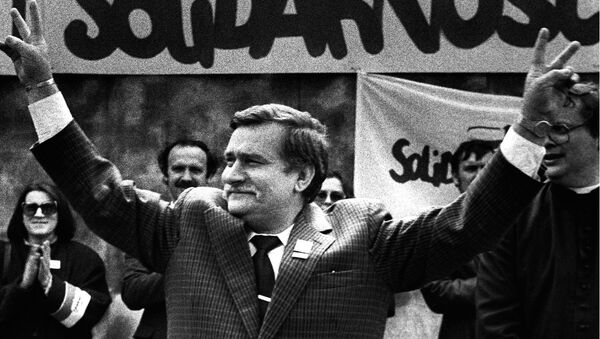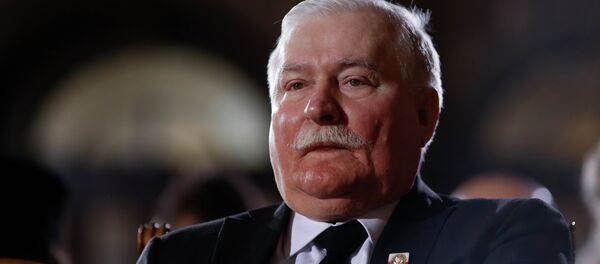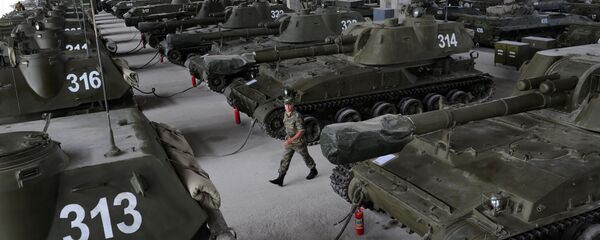Code-named agent 'Bolek', Walesa was said to have informed on the views and actions of fellow workers at the Gdansk shipyards, where the Solidarity Movement, which would end up toppling the country's communist government in 1989, originated.
The government-affiliated Institute of National Remembrance, charged with prosecuting communist-era crimes, said it would analyze the 279 page file on Walesa in due course. And while the allegation that the ex-president was a communist informer is not new, the documents, which the Institute say appear to be authentic, may be the damning proof that the governing Law and Justice party needs to take Walesa's legacy down a peg or two.
Currently an outspoken critic of the conservative nationalist party, Walesa and Jaroslaw Kaczynski, Law and Justice's leader, have been virulent political opponents since the early 1990s, when Kaczynski was ousted from the presidential administration.
Last week, thousands gathered in the (now nearly defunct) Gdansk Shipyard, where Walesa and Solidary got their start, to support the former president, with fellow Solidarity-era strike leader Henryka Krzywonos defiantly telling the crowd that "we achieved freedom and Lech Walesa was our leader," and that "nothing can change that."
Poles rally at Gdansk shipyard; support Solidarity hero Lech Walesa who's victim of Far-Right Govt's smear campaign pic.twitter.com/qTnC3TKbtq
— Tony (@Sparky249) 29 февраля 2016 г.
Commenting on the ongoing scandal in a recent piece for Gazeta Wyborcza, a popular liberal Warsaw-based daily, journalist Janusz Rolicki suggested that "the political and moral tumultuousness we are experiencing today knows few comparable examples in our past. I'm talking about Walesa, from whom his enemies seek to take not only honor and glory, but his good name."
Among them, the columnist controversially argues, is Walesa's success in convincing Russia to remove its military forces from Poland in the early 1990s.
It was Walesa, Rolicki suggests, "who, incredibly, managed to convince [Russian President] Boris Yeltsin to withdraw his military forces from Poland. It is well known that the Russian president's decision was at odds with both his advisors and generals."
The journalist went so far as to say that "the Russian forces' withdrawal was, undoubtedly, the second and bloodless 'miracle on the Vistula'," referring to the 1920 Battle of Warsaw, when the Polish army managed to repulse the Red Army during the Polish-Soviet war of 1919-1921.
"The offensive Russian proverb, which they loved to repeat in Moscow during the era of the Polish People's Republic, about 'a chicken not quite being a bird and Poland not quite being abroad', was not born in a vacuum. And one does not have to have a rich imagination to see that it could have remained relevant to this day if, as planned by Russian strategists, the Russian army had remained in Poland until the end of Yeltsin's presidency, and the rise of Vladimir Putin."

"The consequences for Poland, and the entire region, would be grim," Rolicki noted. "We would not have joined NATO and the European Union. The West, despite all its love for us…would not be able to do so, because of the presence of Russian forces between the Oder and the Vistula. It's not even necessary to think about the hypothetical of Putin leaving Poland, for obvious reasons, because his philosophy is based on the axiom that 'what is Russian remains Russian, and what is not can become Russian'."
"Therefore, I believe that we, for the first time in our complex history, were able as a people to use this historical opportunity that fate had given us, and no one can take Walesa's merit away from him. If in his life he had not achieved anything else for Poland, his success in persuading Yeltsin alone has earned everlasting glory and a place in the national pantheon. He managed to achieve the impossible."
Unfortunately, Rolicki's argument that it was Lech Walesa who convinced Boris Yeltsin to withdraw Russian forces from Poland is a bit of an exaggeration, if not an outright lie. In the early 1990s, even before the collapse of the Soviet Union, Moscow had made several agreements, most famously the 'Treaty on the Final Settlement with Respect to Germany', to begin withdrawing its forces from Eastern Europe. This process was accelerated by the dissolution of the Warsaw Pact in 1991 and the collapse of the Soviet Union at the end of that year.
However, with Yeltsin facing political and economic crises at home, and then seeking to build good relations with Washington and Europe in the post-Cold War world, it's unlikely that Poland, for some reason, would remain the exception in Russia's trend of withdrawing its military forces from all around the globe.
In other words, Poland can and should argue about the legacy of its first post-communist president, but for the sake of sanity, it should leave the Russians, and Yeltsin's decision to withdraw Russian troops from the country, out of the debate.





